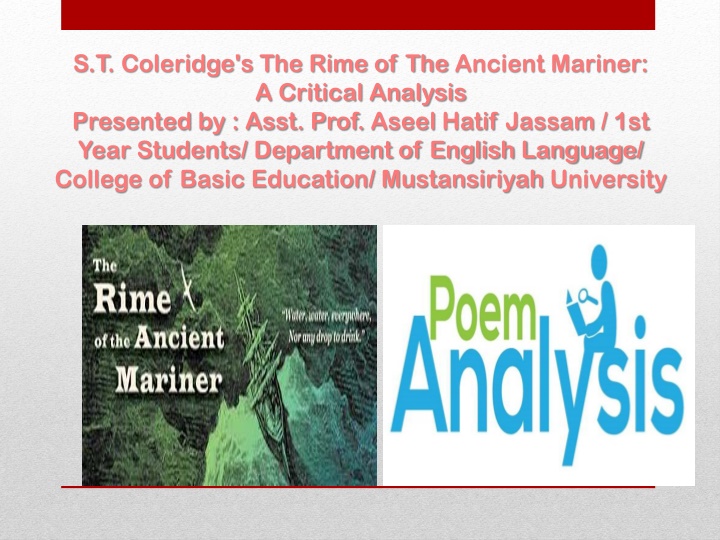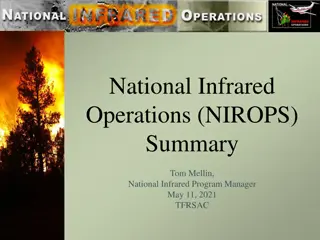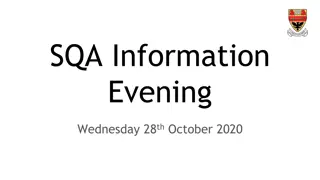Analysis of S.T. Coleridge's "The Rime of the Ancient Mariner
S.T. Coleridge's "The Rime of the Ancient Mariner" is analyzed in detail, focusing on its lyrical ballad form, the mariner's voyage of learning, and the consequences he faces after committing a heinous act. The poem delves into themes of accountability, acceptance, forgiveness, and repentance as the mariner grapples with the repercussions of his actions.
Uploaded on Dec 15, 2024 | 0 Views
Download Presentation

Please find below an Image/Link to download the presentation.
The content on the website is provided AS IS for your information and personal use only. It may not be sold, licensed, or shared on other websites without obtaining consent from the author.If you encounter any issues during the download, it is possible that the publisher has removed the file from their server.
You are allowed to download the files provided on this website for personal or commercial use, subject to the condition that they are used lawfully. All files are the property of their respective owners.
The content on the website is provided AS IS for your information and personal use only. It may not be sold, licensed, or shared on other websites without obtaining consent from the author.
E N D
Presentation Transcript
S.T. Coleridge's The Rime of The Ancient Mariner: A Critical Analysis Presented by : Asst. Prof. Aseel Hatif Jassam / 1st Year Students/ Department of English Language/ College of Basic Education/ Mustansiriyah University
The Rime of the Ancient Mariner as a Lyrical Ballad The Rime of the Ancient Mariner is a lyrical ballad i.e. a poem written in the form and style of a folk ballad which is usually written by an anonymous person. The ballad is a narrative song-poem, usually relating a single, dramatic incident or story, in a form suitable for singing or rhythmical chanting. Folk ballads often have sudden dramatic beginnings, are written in the form of a dialogue usually between the narrator and the listeners as well as between characters. The Rime of the Ancient Mariner is a particular long poem, split into seven sections
The Mariners Voyage of Learning Samuel Taylor Coleridge s The Rime of the Ancient Mariner is about a man on a voyage by ship, who in one impulsive and heinous act, changes the course of his life and death. The Mariner faces an inner struggle over the crime he has committed, and must understand his actions and perform his penance. He must also learn to abandon his negative views and openly accept all of Gods creatures. becomes a journey of learning important lessons in accountability, acceptance, forgiveness, and repentance. After the Mariner kills the Albatross, it is hung around his neck so he can understand the seriousness of his act, but he is incapable of realizing the full implications at this time The voyage now
The Mariners Voyage of Learning The bird was of no danger to the Mariner or the men on the ship, and in fact, was a spiritual guide to safeguard the crew on their excursion. The murder was committed on a whim, with no forethought about the act or the repercussions. The Mariner gives no explanation to the Wedding Guest as to why he killed the bird because he has none. In his essay The Sad Wisdom of the Mariner, A.M. Buchan writes The shooting is an act, unpremeditated and unmeant, that nevertheless must be accounted for . meaning that the Mariner must accept accountability for his actions so he can begin to atone for his sins
The Mariners Voyage of Learning The ship and its crew face difficulties as it comes to a halt on the sea. The Mariner is angry at his fate instead of remorseful for his crime, and he curses the sea and the creatures in it. He has not learned to cherish all of Gods creations and he will pay a price for this. A ship approaches and he is dumbfounded to come face to face with Death and Life-In-Death. With a roll of the dice, Death wins the lives of the crew and, Life-In-Death wins the life of the Mariner. One by one the men on the ship die, leaving the Mariner alone and frightened. He grieves only for himself, at first, saying Alone on a wide sea! And never a saint took pity on My soul in agony
The Mariners Voyage of Learning For seven days and seven nights he is forced to spend time in solitary, reflecting on the events that have occurred, the eyes of the dead sailors fixed on him with blame. states But oh! More horrible than that Is the curse in a dead man s eye! indicating he has begun to understand and accept his responsibility for their deaths. Once this acceptance begins, his solitude is no longer a punishment, but an opportunity for him to realize the exquisiteness of the universe. As he watches the water snakes he begins to perceive them differently, and suddenly their beauty becomes apparent to him for the first time. He
The Mariners Voyage of Learning They are no longer beastly creatures to be condemned, but are creatures of God s universe to be appreciated and loved. This new insight releases him from his invisible chains and he is able to offer a blessing for the water snakes. The albatross falls from his neck, into the sea, and He is on the verge of learning that mysterious and omnipotent spirits govern his destiny. The Mariner has begun to broaden his views and acknowledge the spiritual wonder and joys of the universe. He has learned to release his negative views, and by doing so, has set free the spirits of his dead shipmates. Their spirits rise, aiding the Mariner in his journey home, and guiding him to the Hermit. Even though the albatross is no longer hung from his neck, and the ship is back on course home, the Mariner has not found absolution.
The Mariners Voyage of Learning The Polar Spirits confirm this when they remark The man hath penance done, And penance more will do. The Mariner has learned another lesson, forgiveness must be asked for, and it must also be earned. It is the Hermit that he seeks in order to ask exculpation for his transgressions. Though the Albatross is no longer hung around his neck, the Mariner still has the image of its blood in his mind. He pursues the Hermit because He ll shrive my soul, he ll wash away The Albatross s blood. He feels that if he can have the opportunity to ask for exoneration, he can be released from the inner turmoil he is experiencing. The Hermit asks the Mariner What manner of man art thou?, giving him the opportunity to admit his sins and ask for his penance. Once he spills his story to the Hermit, a feeling of freedom overcomes him.
The Mariners Voyage of Learning It is this feeling he will spend endless days and nights seeking. He is forced to spend eternity repeating his story, searching for the person capable of forgiving his sins, though no one can. The question then is has the Mariner found redemption? The answer would be no, he has not. Redemption brings peace and the Mariner has not found this peace. The crime was senseless, which makes it much more difficult for anyone to understand or forgive, even the Hermit. He has been given a permanent penance to perform, wandering the earth and telling his story. While he may experience a brief period of serenity after each story telling, the guilt inevitably returns and he must go through the cycle again. Lessons have been learned, but the Mariner will pay the price of his sin for eternity























